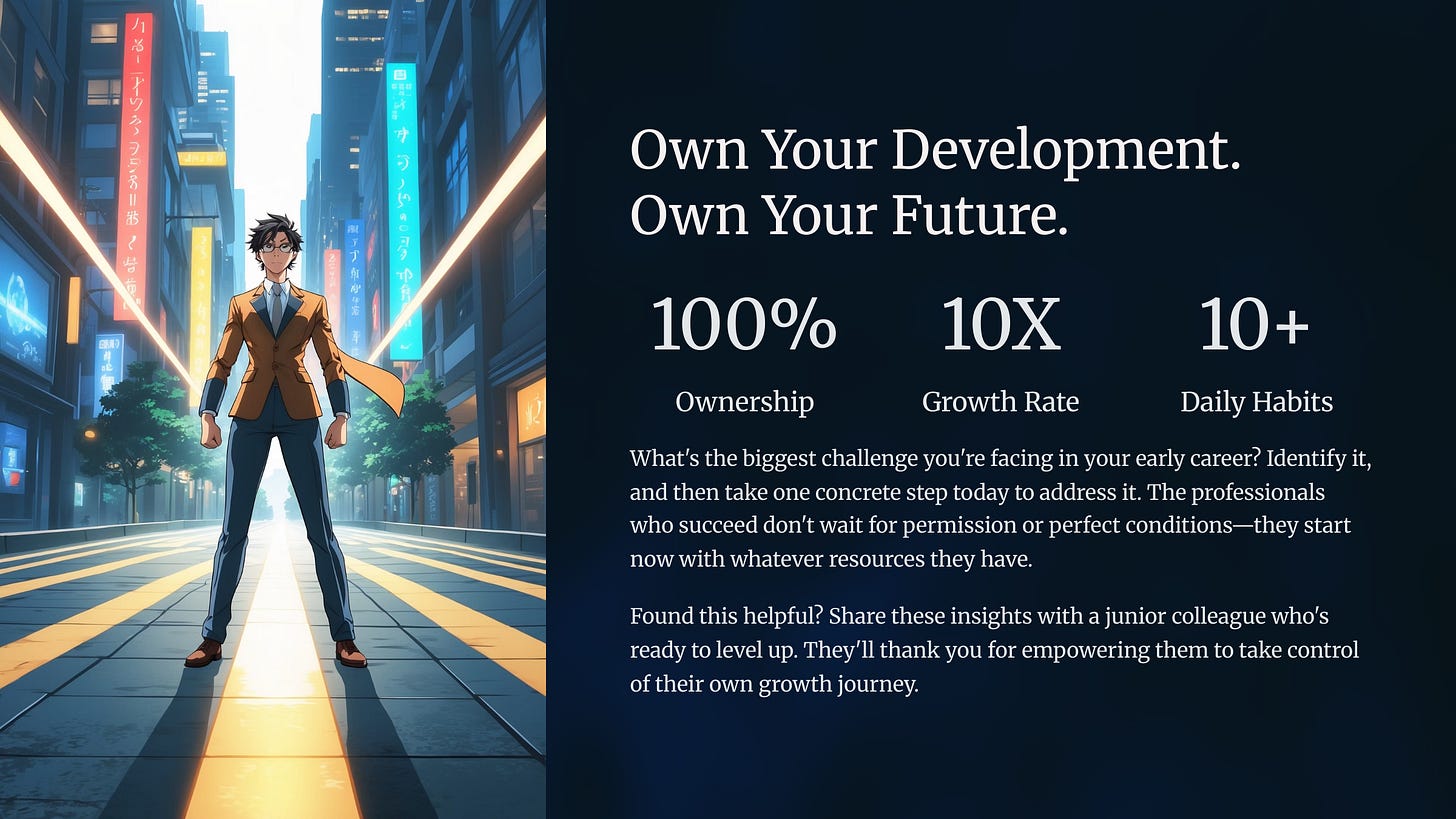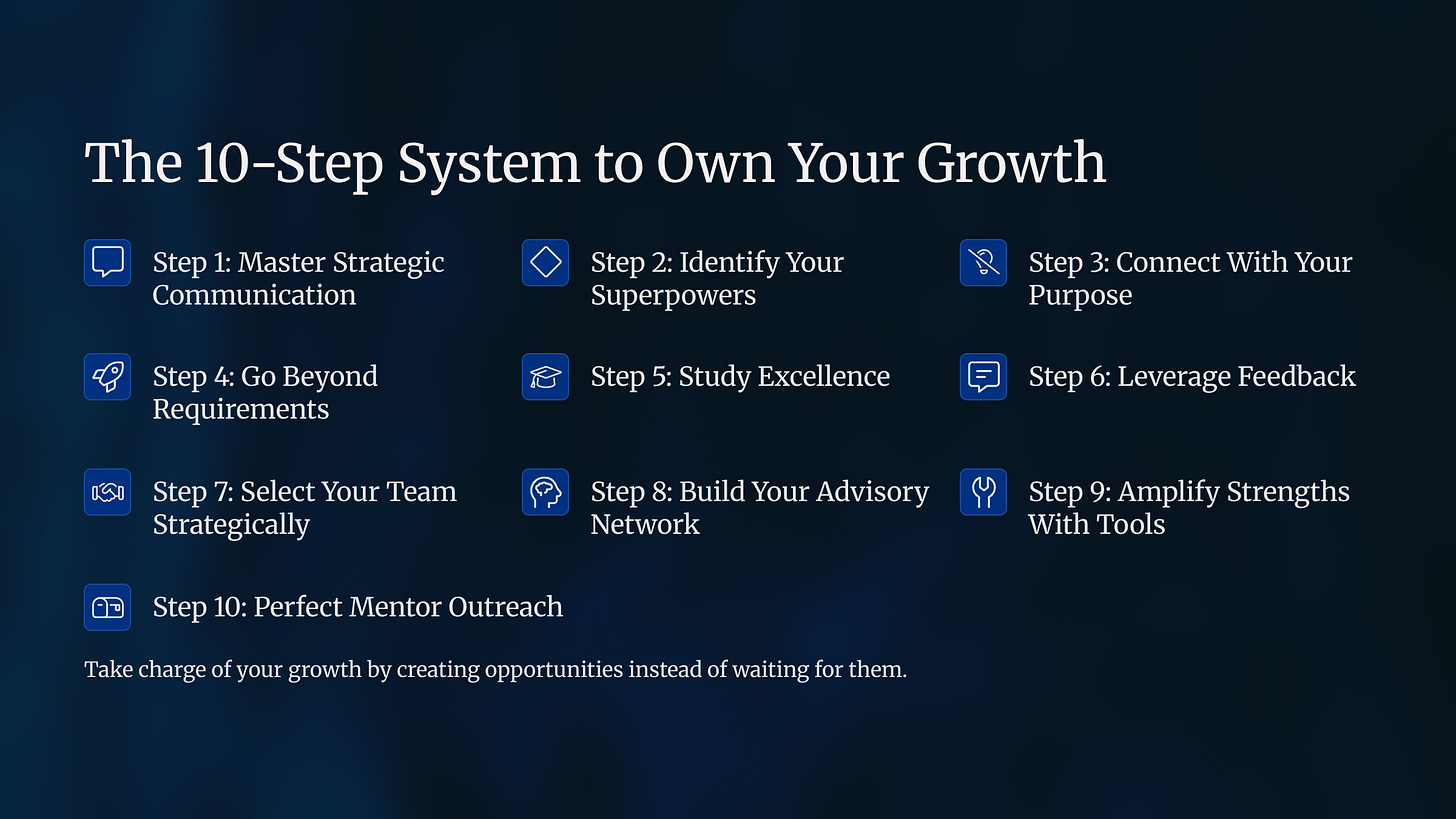Your Manager Isn't Coming to Save You: Stop Waiting to Be "Developed"
The uncomfortable truth about early career growth that no one tells you
My heart sinks every time I open my LinkedIn inbox.
Another message asking to connect because someone was "inspired by my experience." Another request for a 30-minute chat to "learn about my career journey." Another ask for an introduction to someone in my network.
I feel sad because I genuinely want to help everyone—but I can't. I'm recovering from hip surgery, stretched thin between my career, mentoring close friends, and trying to spend meaningful time with family. The reality is that successful people get hundreds of these requests, and there just aren't enough hours in the day.
But it got me thinking: This is exactly why I write this Substack.
I can scale myself by answering the most common questions and helping all those people—if they're willing to put in the hard work of seeking out these resources instead of just asking for my time.
The uncomfortable truth: Your manager isn't coming to save your career. Neither am I. Neither is anyone else.
The fastest-growing people don't wait to be developed. They take ownership from day one.
This is a companion to last week's piece here about how to develop junior people as a mentor or coach. Today I'm flipping the script: Here's exactly how you can take control of your own growth—including the mentor strategy that most people get completely wrong.
The Real Difference Between Good and Great
Everyone talks about skills. Hard skills, soft skills, technical skills.
But after watching hundreds of early-career professionals, I can tell you the real differentiator isn't what you know—it's how you operate.
The all-stars master professional habits first, everything else second.
While their peers are still figuring out how to use Slack, the standouts are already:
Sending proactive updates without being asked
Surfacing blockers before they become emergencies
Meeting deadlines reliably (revolutionary concept, I know)
Communicating scope changes transparently
Good habits beat raw talent over the long run. Every single time.
The 10-Step System to Own Your Growth
Step 1: Communicate Like Your Career Depends on It (Because It Does)
Your teammates aren't mind-readers. If you're stuck, unclear, or falling behind—they need to know immediately.
Silence kills momentum. Proactive communication builds trust.
This means:
Updating your manager before they ask
Speaking up when priorities are unclear
Surfacing risks before they become problems
Asking for help after 20-30 minutes, not 3 hours
Pro tip: The phrase "Hey, quick heads up..." is your best friend.
Step 2: Find Your Superpowers (And Build Your Infinity Gauntlet)
As my mentor Nundu Janakiram says: "Add more stones to your infinity gauntlet."
You need to know two things:
What you love to do and are actually good at (your current superpowers)
What you're excited about but aren't good at yet (your future superpowers)
Knowing your superpowers helps you understand what growth path to pick. Knowing what powers you'll need to achieve the career you want guides you in deciding what to learn, what experiences to seek, and who to learn from.
And here's the thing: your mentors for developing new superpowers don't need to be some super senior executive. Often it's your peer or someone just a little ahead of you who'll give you the most tactical, actionable advice for the baby steps you need to take right now.
Step 3: Always Understand the Why Behind Your Work
Task completion is table stakes. Understanding the mission is what separates doers from thinkers.
Before you start any project, ask:
Who benefits from this work?
What broader goal does it connect to?
If priorities shifted tomorrow, would this still matter?
All-stars don't just do the work—they understand the impact.
Step 4: Show Initiative Beyond the Checklist
Want to stand out? Don't just do what's assigned. Look for ways to make everything better.
Initiative looks like:
Offering solutions, not just pointing out problems
Suggesting improvements that add real value
Taking on stretch assignments without being asked
Managers notice the person who makes the team better, not just the one who finishes tasks.
Step 5: Study Excellence (Don't Reinvent the Wheel)
Don't guess what "good" looks like. Find examples and reverse-engineer them.
Watch how senior people run meetings
Read the highest-performing docs your team has written
Study great PRDs, project plans, user stories
Learning accelerates when you copy excellence, not just effort.
Step 6: Treat Feedback Like Rocket Fuel
When someone gives you feedback, they're giving you a shortcut to growth.
The fastest growers:
Listen actively without getting defensive
Ask clarifying questions
Implement changes immediately
Follow up to show progress
Feedback isn't judgment—it's intelligence.
Step 7: Choose Your Team Like Your Career Depends on It (Because It Does)
Here's something most people don't think about when job hunting: The single biggest factor in your growth isn't the company—it's your immediate team.
When evaluating opportunities, ask yourself: Do the leaders here—especially your potential manager—actually value growth? Both their own growth and growing others?
This is non-negotiable.
A manager who isn't driven by their own desire to improve and grow won't help bring out the best in you. They might be a good person, they might be competent at their job, but if they're not actively investing in their own development, they won't invest in yours.
I've been blessed to have multiple incredible managers and leaders throughout my career, and I'm incredibly grateful for them. But that's unfortunately not a given for most people.
Look for leaders who:
Talk about their own learning and growth
Have clear development philosophies
Invest time in 1:1s and feedback
Celebrate team members' career wins
Are constantly learning new things themselves
Your growth accelerates exponentially when you're surrounded by people who are obsessed with getting better.
Step 8: Build Your Outside Advisory Board (This Is Where Most People Fail)
Here's what most people don't realize: Your best mentors probably don't work at your company.
Internal mentors are great, but they're limited by:
Company politics and dynamics
Potential conflicts of interest
Limited perspective on your industry
The real game-changer? Building relationships with people outside your bubble.
Step 9: Find the Tools That Magnify Your Superpowers
This one is crucial in the age of AI.
You need to identify and master the tools that will:
Magnify your existing superpowers (make you even better at what you're already good at)
Cover your weaknesses (help you be competent in areas where you struggle)
In my case, I've been leveraging tools like Lovable to help me design prototypes and Gamma to create better presentations. These tools don't replace my thinking—they amplify it.
Ask yourself: What are the 2-3 tools that could 10x your output in your current role? Learn them deeply, don't just dabble.
The professionals who thrive in the AI era aren't the ones who resist these tools—they're the ones who use them better than everyone else.
Step 10: Master the Art of Mentor Outreach (Without Being That Person)
Most people approach mentorship all wrong. They slide into DMs asking for "30 minutes to hear about your career journey."
Stop. Just stop.
Here's the thing: Successful people want to help—but they're drowning in requests from people who just want to take, take, take.
The secret? Give value first.
When I reach out to someone I admire, I:
Offer thoughts on their company or recent work
Share insights on something they wrote
Show I've been actively supporting their content
Before you ask for someone's time, show them you respect their time.
The Mentor Strategy That Actually Works
Not every mentor relationship needs to be a formal coffee chat. Some of my biggest influences have no idea who I am.
Simon Sinek is one of my heroes. I've learned more from his talks and books than most formal mentoring relationships. Do I reach out to him directly? Nope. He's busy changing the world, and I'm getting what I need from his thought leadership.
The key: Match the relationship to what you actually need.
For big-picture thinking and inspiration: Follow thought leaders, consume their content, apply their frameworks
For tactical advice and feedback: Build relationships with people 2-3 years ahead of you
For industry-specific guidance: Connect with professionals who've walked your exact path
When You Do Reach Out: The Value-First Framework
If you want to build real relationships with busy professionals, follow this approach:
Before reaching out:
Engage with their content meaningfully
Share their work with thoughtful commentary
Contribute to their community (Substack comments, LinkedIn engagement, etc.)
When you reach out:
Lead with value (insights, observations, helpful connections)
Be specific about what you're looking for
Make it easy to say yes
After they help:
Follow up with outcomes and next steps
Give them updates on your progress
Show appreciation publicly when appropriate
The people who get repeat help are the ones who prove they actually use the advice.
Your 5-Day Action Plan
Want to start owning your growth immediately? Do these five things this week:
Day 1: Send one proactive update (even if not asked)
Day 2: Surface one blocker early
Day 3: Ask for context on a project ("What problem are we solving?")Day 4: Propose one improvement beyond your assigned work
Day 5: Identify three potential outside mentors and engage with their content
The Compound Effect
Here's what happens when you own your development:
Month 1: People start noticing your proactive communication '
Month 3: You get invited to more strategic conversations
Month 6: You're getting stretch assignments and bigger projects
Year 1: You're the person everyone wants on their team
Your early career isn't something that happens to you. It's something you build.
The people who take ownership early get the best projects, the fastest promotions, and the most interesting opportunities later.
Own your development. Own your future. It starts now.
What's the biggest challenge you're facing in your early career? Hit reply and let me know—I read every response and often turn them into future articles.
Found this helpful? Forward it to a junior colleague who's ready to level up. They'll thank you.
Disclaimer
The views and opinions expressed in this article are my own and do not reflect the views of any current or past employer. This content is independent and intended for educational and professional development purposes only.
Keywords
early career development, professional growth, mentorship, career advice, product management, professional habits, communication skills, feedback, networking, career acceleration, Substack, professional development







Hi Rina! Really glad this resonated. Key aspects that make an effective routine for me are:
1. Starting every day with a habit that centers me - for me it's quick gratitude journal and 5 mins of stretching or yoga
2. Make a clear list of priorities for your day - I prefer pen and paper, my daily priorities are aligned with weekly priorities I set at the beginning of the week
3. Follow your calendar as a guide to avoid losing focus (I put in time to do my tasks)
4. Have a clear ritual for ending work so you can reset
Super insightful!! Thank you Rodolfo for sharing this amazing content that guide junior to grow infinitely!